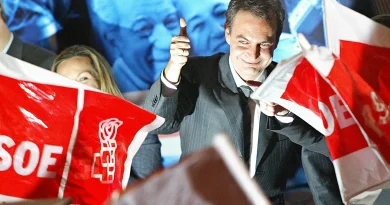Russia launched counter-satellite space weapon, U.S. says as Kremlin begins nuclear drills near Ukraine
Russia accused the United States of disinformation Wednesday after the Pentagon said Moscow had launched what it assesses to be a counterspace weapon into the same orbit as a U.S. government satellite.
The latest clash between the Kremlin and Washington came as Moscow kicked off exercises to simulate the use of tactical nuclear weapons, in a likely signal to the West against deeper involvement in Ukraine.
In a briefing Tuesday, Pentagon spokesperson Maj. Gen. Pat Ryder said the U.S. has assessed that Moscow deployed the satellite on May 16. “Russia launched a satellite into low Earth orbit that we assess is likely a counterspace weapon, presumably capable of attacking other satellites in low Earth orbit,” Ryder said.
It was launched into the same orbit as a U.S. government satellite, Ryder said, without elaborating on whether the American satellite was in any immediate danger.
The U.S. will be monitoring the situation, he added, but is ready to protect the “space domain.”
Russia’s state space agency, Roscosmos, said in a statement in the early morning hours of May 17 local time that a Soyuz launch vehicle with “spacecraft on board” took off from its Plesetsk cosmodrome in northern Russia “in the interests of the Ministry of Defense of the Russian Federation.” It was unclear whether the launch was related to the “counterspace weapon” that the U.S. assessed Russia put into space.
The latest space feud comes three months after Washington raised fears that Russia was developing a space-based nuclear weapon potentially designed to target U.S. satellites. Moscow strongly denied it, with President Vladimir Putin saying he was categorically against the deployment of nuclear weapons in space.
The new U.S. assessment was once again dismissed by Russia on Wednesday.
“I don’t think we should respond to any information hoax from Washington,” Deputy Foreign Minister Sergei Ryabkov was quoted as saying by state news agency Tass, adding that Russia has consistently opposed the deployment of weapons in low Earth orbit.
Kremlin spokesman Dmitry Peskov told a daily news briefing that Russia has been acting in accordance with international law and has repeatedly called for a ban on any weapons in space, but those initiatives have been turned down, including by the U.S.
Washington and Moscow have clashed over the space weapons issue at the United Nations in recent weeks.
A Russian-drafted Security Council resolution that called on all countries to prevent “for all time” the placement, threat or use of any weapons in outer space failed on Monday. Foreign ministry spokeswoman Maria Zakharova called the outcome of the vote “disappointing,” saying that the U.S. and its partners had once again demonstrated their “true priorities” in the space field, including transforming it into an “arena of military confrontation.”
But Russia vetoed a U.S.-drafted resolution last month that called on countries to prevent an arms race in outer space.
The latest exchange of rhetoric comes amid growing tensions between Russia and the U.S. over Washington’s continued support for the Kyiv fight in the two-year war. Putin has engaged in nuclear brinkmanship on many occasions throughout the war, threatening to unleash Russia’s powerful nuclear arsenal if its existence is threatened.
On Tuesday, his defense ministry said it had begun the first phase of the drills on the preparation and use of non-strategic nuclear weapons in its Southern military district, which borders Ukraine.
The exercises were ordered by Putin earlier this month. The defense ministry reiterated Tuesday that the drills were in response to “provocative statements and threats of certain Western officials regarding the Russian Federation,” in a likely reference to a growing discussion around the possibility of sending NATO troops to Ukraine.





